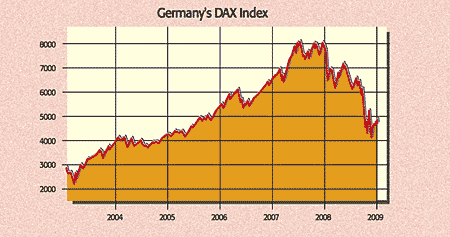
Germany is nursing a “morning-after headache without having enjoyed the binge”, says Lex in the FT. There was no Anglo-Saxon-style housing and consumer credit binge over the past few years. Household indebtedness is comparatively low and consumers have added to their savings over the past decade. “The government has been frugal” too. All this suggests it should recover more quickly than its rivals. But for now, Germany is in the “same boat as the bingers, even if it does have a better seat”, as the FT puts it. Its dependence on exports – it is the world’s top goods exporter – is hitting the country hard as the global economy tanks and world trade dries up. Exports slumped by 11% in November alone, while industrial orders fell by 6% on the month, and were 27% down on the previous year.
Consumers, who were reluctant to open their wallets during the good times, look unlikely to take up the slack now that unemployment has begun to tick up. Throw in the fact that most banks got their fingers burned by exotic US securities and so are tightening credit, and it’s no wonder the recession is deepening. The e50bn stimulus package announced this week looks inadequate, and in any case will only kick in later this year. Dominc Bryant of BNP Paribas expects the economy to shrink by 3% this year, the worst fall since 1949.
Germany’s exposure to the global economic cycle is reflected in its benchmark DAX index – chemicals, automobiles and industrial goods firms, many of whom are exporters, comprise 44% of the index. That makes it “the most sensitive of the major European indices to further downgrades in global growth expectations”, says Goldman Sachs. So it’s particularly vulnerable to further falls, and there will be plenty more bad news as the world is sliding into the worst recession since 1945, as Joerg Rahn of M.M. Warburg points out. Note too that earnings estimates for this year still look too generous, says Wirtschaftswoche. Nor is it compellingly cheap compared to other European markets, according to Goldman.
Rahn says that a recovery in the Ifo German business confidence indicator and America’s purchasing managers’ index, the ISM, are key preconditions for a sustainable recovery in the market. The good news is there should be substantial upside once this arrives: when the outlook clears and markets begin to plan for recovery, Germany’s market is likely to “move ahead quickest”, says Goldman. But it may take some time.